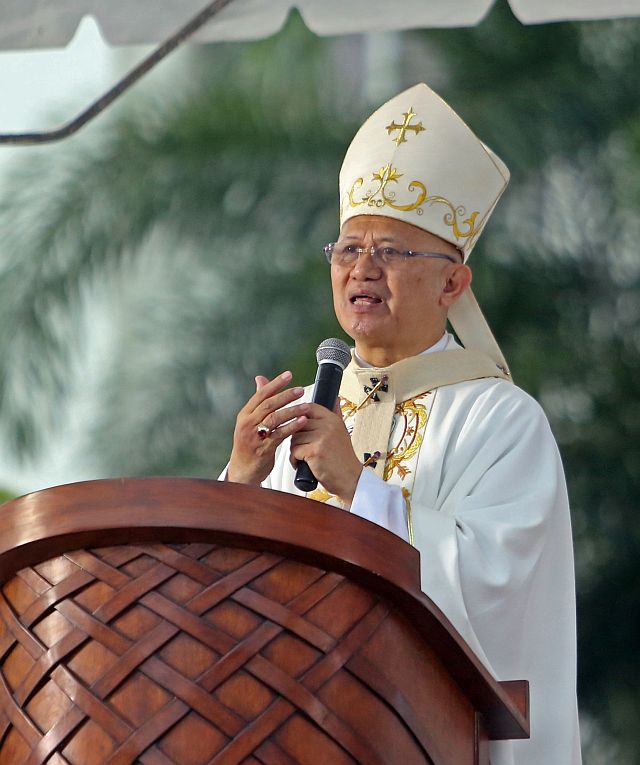
Cebu Archbishop Jose Palma
The Catholic Bishops’ Conference of the Philippines (CBCP) on Tuesday expressed its support for the investigation of government officials allegedly involved in the drugs trade.
In a letter titled “Our Country and Our Faith” that touched on various issues, CBCP President Lingayen-Dagupan Archbishop Socrates Villegas said the probe of government officials involved in drugs “must spare none.”
“We are very disturbed by the possibility that high-ranking officials could have been involved in the drug-trade. The investigation must be thorough … and must spare none,” Villegas wrote, without naming the said officials.
Cebu Archbishop Jose Palma, as he echoed the same call, likewise acknowledged the effort of the Duterte administration to stump out the drug menace, calling it the “mother of many crimes.”
“To the credit of the administration, they have made us aware of how serious the drug problem is,” he said. “As we often say, drug is the mother of many crimes. The ongoing efforts to prosecute those who are involved in drugs, it is also part of the whole system that I think can hopefully, should bring about good in the country. On our part, we are supportive of all the legal processes that should make us discover or find out the culprit in many of these crimes that happened.”
The prelate said he would want to leave it to the competence of the Senate and other concerned authorities to ascertain who are guilty and have them “face the consequences of their crime.”
Palma said that in prosecuting those who are guilty of being involved in the drugs trade, he hoped that it would send a message that what they are doing destroy lives, something that society should not only be sad but also mad about. Palma also pointed out that with thousands of drug users or peddlers having surrendered and wanting to change their lives, it is important for the community to help those who have come out crying for help.
“I’m sure there are ways we can help them to journey, act towards decent lives and experience healing and of course eventually, embark on certain activities that would make life meaningful,” the prelate said.
“As always, we pray that the truth about who is guilty and the consequence of facing their guilt. May we learn that crime does not pay, but we also hope that all of these are done in a legal way,” he added.
President Rodrigo Duterte, in his so-called narco lists, had named local chief executives, policemen, judges and other personalities involved in drugs.
Duterte and his allies also tagged Sen. Leila de Lima in the proliferation of drugs at the national penitentiary and accused her of receiving money from drug lords to fund her campaign. The lady senator has vehemently denied the allegations.
Villegas, on the other hand, reiterated the Church’s alarm over the mounting death toll in the Duterte administration’s war on drugs that claimed about 3,000 lives in the first three months, saying that reports of drug suspects shot dead for allegedly resisting arrest were “very disturbing and truly distressing.”
“There is no way that a government can credibly claim that it is waging a relentless war on drugs to preserve life – while in the process abetting, encouraging or fomenting the destruction of life thought – wrongly – to be unworthy!” Villegas said.
“The observations of international watchers and monitoring groups should not be cavalierly dismissed as statements of those who do not know the reality ‘on the ground.’ These are
specialized agencies of an international stature, and when they warn that human rights are egregiously violated, their warnings ought to be heeded by any conscientious government,” he added.
The Lingayen-Dagupan archbishop said the campaign against drugs and upholding of human rights can go hand in hand and should not oppose the other.
“There can be no opposition between the campaign against drugs and the campaign for human rights. In fact, any opposition renders one or the other meaningless and fruitless. We seek the elimination of the drug trade and an end to the proliferation of habituating substances because they constitute a real threat to well-being. But we cannot be consistent in this resolve by denying some the right to their own well-being, fundamental to which is the right to life!” Villegas said.

